Yesterday, Facebook notified me that I have been on the site for 8 years, and I think it’s safe to say that my social networking skills have progressed since I first started using it in 2008.


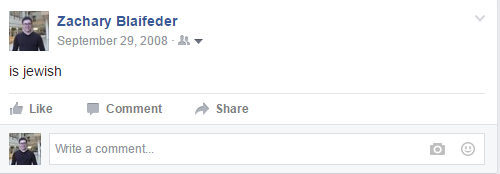
As my time on Facebook increased, and my statuses became more mature, I started to notice some of the nuances of the site. This caused me to become aware that many of my Facebook friends were inadvertently making mistakes that they probably were not even aware that they were making.
Fear not though! Below, I’ll list some of these errors and how you can fix them so that you add “savvy social media user” to your résumé.
Mistake 1: You’re not seeing all of your friends’ posts.
When I first started using Facebook, everything I saw was ordered chronologically. Several years ago however, Mark Zuckerberg and his team changed their algorithm of how posts show up on your News Feed. This means that your Facebook friend (who you are really only acquaintances with in real life) with their photo of feeding some starving kids in Africa may appear miles ahead of Grandma’s post about chopped liver. The reason this is is happening is because the post about helping African children received many more likes than your Grandma’s (she only has 14 friends).
Relax! There’s a way to fix this. At the top left corner of your Facebook sidebar, there is a News Feed icon. Click on the downward facing triangle (as shown in the picture below) and you will be able to view posts in the order in which they appear. You can breathe easy again now.
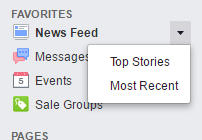
Mistake 2: You’re not liking the correct picture.

On January 27th, 2014, I created a post on Facebook asking my friends to like a mediocre picture that I had taken in Israel on my aging 9.0 megapixel (that’s kind of cruddy in today’s standards) Nikon Coolpix digital camera. This was part of a photo competition run by my university’s Hillel after the completion of their Birthright trip that I had just participated in. This contest had pretty high stakes: a $20 gift card to Starbucks was on the line.
I kindly requested in my post that people like the ORIGINAL photo posted on Hillel’s album. 8 people did not follow my directions and liked MY post instead of my photo on Hillel’s post. Of those 8 people, none liked the original photo on Hillel’s page. (which 20 people had liked). If everyone had followed my directions, I could have had a 40% increase in likes on my original post and would have a tiny bit closer to the the number of likes that the victor’s picture had, 101.
The moral of the story: If a friend asks you to like a picture so that they can win something, make sure you follow their directions! You may have to click a few times to ensure your like ends up in the right place, but the Frappuccino your friend will win in the end will be worth it.
Mistake 3: Your hashtag activism is useless
Social media has quickly become one of the most useful mediums for activism. Whether bringing awareness to canine dysentery or trying to stop that war-in-the-place-that’s-very-far-away, it seems like everyone around us is trying to advocate for something.
One way the internet learned to consolidate posts of the same subject nature is through hashtags, symbolized through the # symbol followed by a word or phrase. One of the more popular charitable causes I have seen my Facebook friends be involved with over the years has been Penn State’s THON (#FTK, #amirite?). For last year’s event, hashtag activism had taken over my Newsfeed with full force.
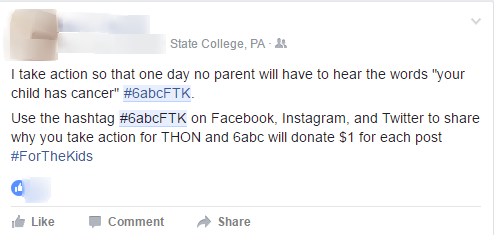
Now it’s real nice that ABC 6 is going to donate $1 when you post with the hashtag #6abcFTK. But do you notice the little symbol right next to where it says “State College, PA”? That means the post was only shared with the friends of the original post, leaving the sponsor of this social media fundraiser (ABC 6) unable to see the post. Dollar wasted!
If you are ever in this situation in the future, you need to make sure that your posts are PUBLIC so that the entire world can see it. Remember, you can choose which of your posts are public or viewable to your friends only. In this instance, it would have been wise for this Facebook friend of mine to make their post visible to all.
Mistake 4: You’re not letting people share your posts.
On March 15th (Super Tuesday for the political wonks out there) of this year, I made a Facebook status where I deemed the Republican nominating process essentially over in favor of Donald Trump and urged my friends (Democratic and Republican) to support the Democratic nominee due to Trump’s corruption, narcissism, and racism among many other bad qualities.
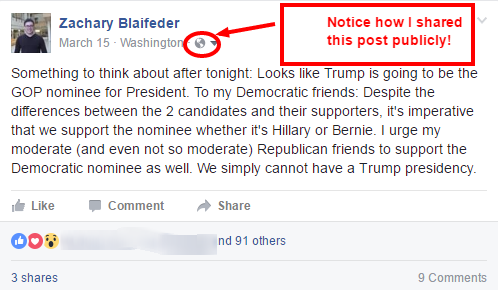
I “appreciate the congrats” for (unfortunately) being right about Donald Trump being the nominee. In fact, several friends found this statement so bold and inspiring that they wanted to share it. When someone messaged me asking if they could do so, I said yes, and then scrambled to change the privacy settings of my post to public.
You see, if I left this prophecy just for my friends’ eyes, my friends’ “shares” would have been useless as the post would have just been recycled among our mutual friends. By making my status public, anyone who wanted to share my status would be able to do so to ALL of their friends.
Mistake 5: You’re being played by internet hoaxes.
You awake one morning from a pleasant’s night slumber. As you scroll through your News Feed, your tired eyes become wide open after reading this:
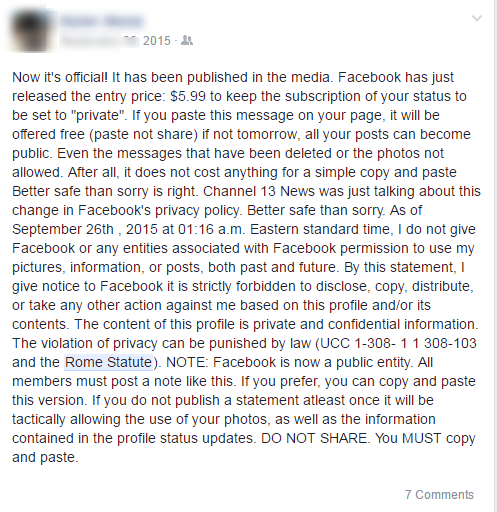
Seeing that a) the post has a ton of legalese (sounds official!) b) the media mentioned it (so it must be true!), and c) it references the Rome Statute (a fancy law which you probably have never heard of before), you deem this post legitimate. With no further investigation needed, you post the same exact thing to your timeline, forever making Facebook free for you to use.
Two minutes later, a friend comments, “that’s fake,” and to preserve your integrity, you scan what you just almost blindly put on your page and slyly reply “better safe than sorry!”.
Do yourself a favor and do quick 10 second Google search before you embarrass yourself in front of all of your internet friends. You’ll see that it’s a hoax and you can merrily move on with your day.
_________________________________________________________________
Hopefully you’ve learned a thing or two after reading these Facebook pointers. Now, go on and continue to post Harambe memes, cute animal gifs, and Buzzfeed quizzes about what type of muffin represents your personality! Keep getting those internet points!
You can thank me later.